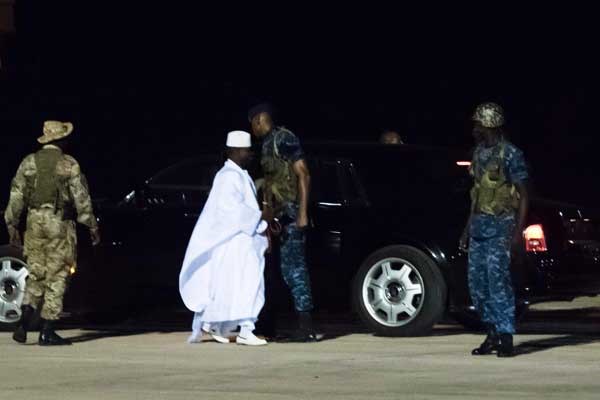Exiled strongman Jammeh ‘plundered’ Gambia coffers

Gambia’s exiled strongman Yahya Jammeh plundered millions of dollars in his final weeks in power leaving state coffers “empty”, an aide to new President Adama Barrow said as West African troops prepared to secure his arrival.
Jammeh flew out of The Gambia on Saturday, ending 22 years at the helm of the small west African nation, and headed for Equatorial Guinea where he is expected to settle with his family.
A West African military force entered The Gambia Sunday — greeted by cheers from relieved residents — to provide security and allow Barrow, who has been in neighbouring Senegal for more than a week, to return and take power.
But amid growing controversy over the assurances offered to Jammeh to guarantee his departure, Barrow aide Mai Fatty said the new administration had discovered that some $11 million had recently been stolen.
“The coffers are largely empty,” he told reporters in the Senegalese capital Dakar.
“Over two weeks, over 500 million dalasi ($11 million) were withdrawn. As we take over, the government of The Gambia is in financial distress,” he said.
Following Barrow’s win in the December 1 election, Jammeh refused to step down, triggering weeks of uncertainty that almost ended in a full military intervention.
Jammeh slunk off in the early hours of Sunday on an unmarked plane. Barrow is eager to return “as soon as possible”, Mai Fatty said, warning however, that “the state of security in The Gambia is still fragile.”
ECOWAS
On Sunday, “additional forces crossed into The Gambia to beef up the numbers already on the ground,” Barrow said, according to a statement read out by Mai Fatty.
The new administration wants the Economic Community of West African States (ECOWAS) forces to stay on. “We want their mandate to be extended,” Mai Fatty said, adding that Barrow was waiting for assurances of loyalty from the security forces, including the police and the army.
Jammeh personally controlled certain sections of the security forces, and his long tenure was marked by systematic rights abuses, including extrajudicial killings, torture, and arbitrary detention.
The Senegalese general leading a joint force of troops from five African nations said soldiers would “control strategic points to ensure the safety of the population and facilitate… Barrow’s assumption of his role”.
Marcel Alain de Souza, a top ECOWAS official, said the country “could not be left open” for long, and that Barrow must be in place “as soon as possible”.
A senior Senegalese military source told AFP that his forces had met little resistance on Sunday, as army chief Ousman Badjie has already declared his loyalty to Barrow.
Critics have raised concerns over the wording of a statement issued by the UN, ECOWAS and the African Union that seemed to offer Jammeh comfortable guarantees for his future.
“No legislative measures” would be taken that would infringe the “dignity, security, safety and rights” of Jammeh or his family, it said, noting that property “lawfully” belonging to him would not be seized.
However, experts told AFP the document was not legally binding.
Equatorial Guinea is not a signatory to the Rome Statute that established the International Criminal Court, meaning Jammeh would not be extradited in the event he was charged with crimes against humanity or other serious offences.
His expected arrival in the country was met with ire as the opposition Convergence for Social Democracy (CPDS) blasted President Teodoro Obiang Nguema for showing “contempt” towards Equatorial Guinea and “thinking only of his personal gain” by granting Jammeh “political exile”.
Obiang is a similar strongman to Jammeh and has been in power since ousting his uncle in 1979.
Jammeh took power in a 1994 coup from the country’s only other president since independence from Britain, Dawda Jawara, making this The Gambia’s first democratic transition of power.
The new administration’s first priority will be to ensure the safe return of tens of thousands of people who have fled in recent weeks fearing a bloody end to the crisis.
The crisis had also sparked the exodus of thousands of foreign visitors, dealing a potentially devastating blow to a country which earns up to 20 percent of its income from tourism.
AFP